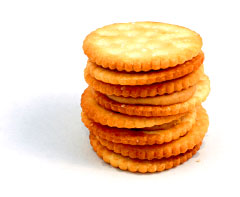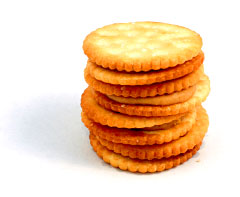Dear Umbra,
This tainted peanut butter recall is crazy. I have a box of crackers with peanut butter. Can I safely compost them in my hot compost pile?
Jane
Vallejo, Calif.
Dearest Jane,
Let me first say I am very sad for those who have been killed in this outbreak. My deepest sympathies to their families. There’s no reason anyone should be killed by food in these modern times. It’s outrageous.

Put the cracker down and slowly back away.
As of this writing, the Salmonella typhimurium was traced to the Peanut Corporation of America, of course in Georgia, which mainly sells peanut butter and paste for use in processed foods. My favorite recalled food is “Herd of Laughter Tin Can Alley Ice Cream.” No one’s laughing now, obviously. The FDA has made their Peanut Corp. inspection report public [PDF]. Interpretation by yours truly and others indicates that the PCA did not have procedures for ensuring sufficient, pathogen-killing roasting of the raw peanuts, and did not adequately clean equipment after previous positive tests for salmonella. The rest of the report details various dirty parts of the plant (“the … rollers of this conveyor were covered with a slimy, black-brown residue,” “on 1/9/09 a live roach and several dead roaches were observed …”), as well as poor equipment layout and product storage. The origin of the salmonella is not clear from FDA or CDC materials.
Remember our raw milk discussion a few weeks ago? I’m an advice columnist, and it’s feasible that people might follow my advice. Hence, in matters of potential life and death, it is my job to offer conservative suggestion served on a bed of concerns. Salmonella can give you diarrhea, fever, and abdominal cramps, and can of course cause death. It also can lead to Reiter’s syndrome — pain in the joints, pain whilst urinating, irritated eyes — which can then lead to arthritis. Obviously one should not eat recalled products, and vendors should follow the FDA suggestion to “stop selling recalled products” (ah — thanks, was wondering).
Treat your tainted peanut products as you would treat unwanted raw chicken bits. If you are fortunate enough to have a recalled product in hand rather than in GI tract, throw it away without opening it. Wash your hands carefully if you had to touch salmonelly foods, keep such foods away from children and the elderly, etc.
I wouldn’t compost infected products unless you already run a composting system that is capable of handling dead animals and manure. And even then I’d think twice or thrice: The danger, remote as it may be, is that the salmonella will stay alive in your compost and wend its way back to your mouth via garden vegetables or soil handling.
All that said, technically you may compost pathogen-tainted foods, including meats, eggs, and manure, if your compost reaches and maintains a temperature of 135 degrees for several days. This is not something to guess about. If you have such a pile, you are a serious composter who knows it. The rest of you, don’t mess around.
Salmonella aside, peanut butter is not a recommended compost material. Oily, greasy foods like peanut butter, regular butter, and cooking oils take a while to break down in a pile. Again, if you’re a serious, hot pile-making composter, I do think the grease rule can be ignored, but if you’re a casual composter annoyed about pools of rancid oil in your lovely compost, eschew slimy stuff.
Pathogenically,
Umbra


